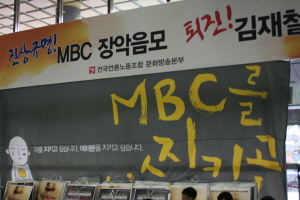Broadcasting stations including MBC, YTN and KBS have been out on strike. Their common area of purpose is in fairness of reporting the news. Those who support the strikes advocate their claims that government puts pressure on the broadcasting stations when they report news. However, it is a brutal fact that the strikes themselves have to be blamed on each of these broadcasting stations - responsibility is on both sides.

Courtesy of MINBYUN-Lawyers for a Damocratic Society.
Government pressure on public opinion connotes a fairness problem of reporting in the news. Although television broadcasting should be clean and honest as the most powerful medium facing the public, broadcasting stations are polluted by external pressures. Out of the few broadcasting stations that are on strike at the moment, MBC is at the center of the current phenomenon. Recently, strikes have often broken out at MBC. Originally, the Foundation for Broadcast Culture (FBC) was a type of buffer that was used to protect the independence of MBC from external pressure, including political power. Unfortunately, FBC has started regulating MBC during the MB regime. It directly appointed a person who is favorable with the government to top duties abusing the right of personnel management.
For example, after former MBC president Ki-Young Um voluntarily resigned, Jae-Chul Kim was replaced as the new president. MBC has had five strikes since president Lee took power. Mainly, the strikes occurred against the broadcasting reform bill created by the Grand National Party (currently the Saenuri Party) in 2010 and against Jae-Chul Kim for suppression and domination of media. As a result of this strike, new episodes of 'Muhandojeon,' one of the most famous entertainment tv shows on MBC, has not been on the air for twelve weeks, which is a new record. Other programs on MBC have also been substituted by reruns.
Similarly, the former prime minister of Italy, Silvio Berlusconi, has been criticized for suppression of the press. He revised laws for covering his irrationality after he was elected premier with great personal marketing. He eventually grasped 90 percent of Italy's media. Even though national competitiveness was ranked the lowest and building corruption was ranked the highest, Italian media were forced not to report these due to outside pressures. In addition, a demonstration of three million people was not reported on the news. As a result, continuous support of Italians without knowing the dark side of their country made it possible for the president to carry on his leadership for 3 terms until last year.
Korean media has not yet reached Italy's level of severity; however, if strikes continue to happen and government grasping of media is ignored, the future of Korean media is uncertain.
The Dankook Herald (DKH) interviewed professor Tae-Kyu Son in the School of Journalism and Communications to consult about the issue.
DKH: What do you think of the opinion that the strikes at MBC are caused by violation of authority to appoint the president?
Son: MBC needs to be released from the power of politics and capital as a public broadcasting system. If not, it does not even match the station's fairness. The problem is the structure which allows for the ruling party's domination of Korea Communications Commission (KCC) so that they can interfere on appointing to president.
DKH: There is an intriguing view that the purpose of the strikes is just to gather people for their grievance of president Lee. What is your opinion on this?
Son: Criticism of the government has been shut down as MBC got dominated gradually. Therefore, the intriguing view must have appeared as a result of a misunderstanding and is just an overstrained interpretation of an effort to swing the station back to its original state.
DKH: The damage of the strikes is affecting audiences. Do you think they might be able to fuse the tension through talks?
Son: This request of audiences is rather reasonable; however, it is just a palliative. The independence of public broadcasting systems should be accomplished by moving away from the political intention of ruling.
DKH: Do you see this whole phenomenon of people supporting the strikes as positive?
Son: This is definitely positive, as I think public broadcasting stations must gain independence from outside powers. As the unfair dismissal of Tae-Sub Sin (administrator of KBS) was ruled for acquittal four years ago, I think this movement is necessary for our media's independence.
DKH: Lastly, please tell us your view on the current regime's deeds and suggest a desirable way to solve the current issue.
Son: According to Reporters without Borders, freedom of speech got worse under the current regime and former president Rho's regime. Solving this problem should be the first to fix the whole disaster.
To put professor Son's view in a nutshell, domination of media has to be blamed on government, and the resistance of labor unions seems necessary for freedom of speech. However, his opinion is only a part of various views of experts on this field. Although it turns out to be true, fundamental responsibility for the strikes lies with the broadcasting stations. Audiences are victims of a trial of strength between the government and media. If the government's pressure on media is true, viewers will support the strikes, if not, they will ostracize the broadcasting stations. We all want these strikes to be over and to watch new episodes of 'Muhandojeon' as well as news programs that report only the truth.
Sang-Hag Lee dkherald@gmail.com

![[Campus Magnifier] Let's Surf the Library!](/news/photo/202404/12496_1765_4143.jpg) [Campus Magnifier] Let's Surf the Library!
[Campus Magnifier] Let's Surf the Library!
![[Campus Magnifier] Let's Surf the Library!](/news/thumbnail/202404/12496_1765_4143_v150.jpg)





